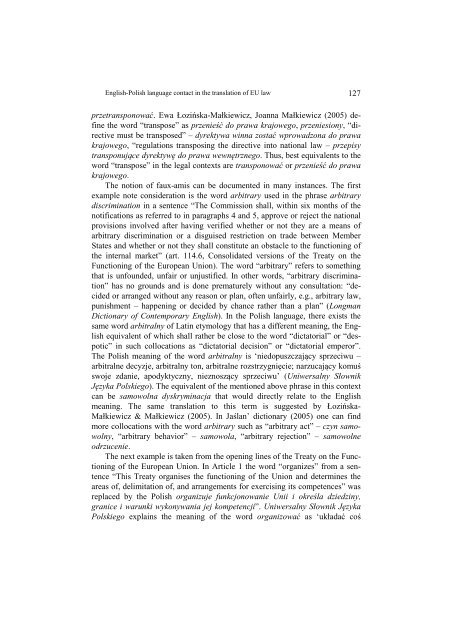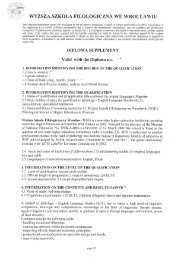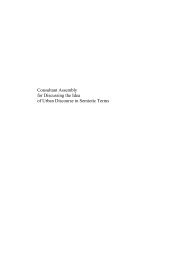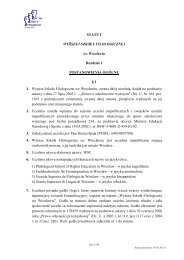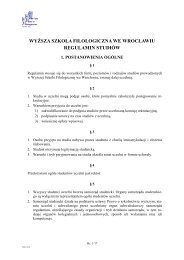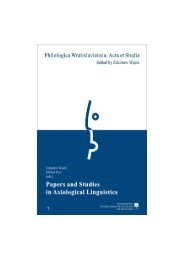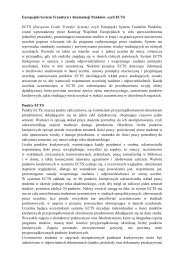s - Wyższa SzkoÅa Filologiczna we WrocÅawiu
s - Wyższa SzkoÅa Filologiczna we WrocÅawiu
s - Wyższa SzkoÅa Filologiczna we WrocÅawiu
You also want an ePaper? Increase the reach of your titles
YUMPU automatically turns print PDFs into web optimized ePapers that Google loves.
English-Polish language contact in the translation of EU law 127<br />
przetransponować. Ewa Łozińska-Małkiewicz, Joanna Małkiewicz (2005) define<br />
the word “transpose” as przenieść do prawa krajo<strong>we</strong>go, przeniesiony, “directive<br />
must be transposed” – dyrektywa winna zostać wprowadzona do prawa<br />
krajo<strong>we</strong>go, “regulations transposing the directive into national law – przepisy<br />
transponujące dyrektywę do prawa <strong>we</strong>wnętrznego. Thus, best equivalents to the<br />
word “transpose” in the legal contexts are transponować or przenieść do prawa<br />
krajo<strong>we</strong>go.<br />
The notion of faux-amis can be documented in many instances. The first<br />
example note consideration is the word arbitrary used in the phrase arbitrary<br />
discrimination in a sentence “The Commission shall, within six months of the<br />
notifications as referred to in paragraphs 4 and 5, approve or reject the national<br />
provisions involved after having verified whether or not they are a means of<br />
arbitrary discrimination or a disguised restriction on trade bet<strong>we</strong>en Member<br />
States and whether or not they shall constitute an obstacle to the functioning of<br />
the internal market” (art. 114.6, Consolidated versions of the Treaty on the<br />
Functioning of the European Union). The word “arbitrary” refers to something<br />
that is unfounded, unfair or unjustified. In other words, “arbitrary discrimination”<br />
has no grounds and is done prematurely without any consultation: “decided<br />
or arranged without any reason or plan, often unfairly, e.g., arbitrary law,<br />
punishment – happening or decided by chance rather than a plan” (Longman<br />
Dictionary of Contemporary English). In the Polish language, there exists the<br />
same word arbitralny of Latin etymology that has a different meaning, the English<br />
equivalent of which shall rather be close to the word “dictatorial” or “despotic”<br />
in such collocations as “dictatorial decision” or “dictatorial emperor”.<br />
The Polish meaning of the word arbitralny is ‘niedopuszczający sprzeciwu –<br />
arbitralne decyzje, arbitralny ton, arbitralne rozstrzygnięcie; narzucający komuś<br />
swoje zdanie, apodyktyczny, nieznoszący sprzeciwu’ (Uni<strong>we</strong>rsalny Słownik<br />
Języka Polskiego). The equivalent of the mentioned above phrase in this context<br />
can be samowolna dyskryminacja that would directly relate to the English<br />
meaning. The same translation to this term is suggested by Łozińska-<br />
Małkiewicz & Małkiewicz (2005). In Jaślan’ dictionary (2005) one can find<br />
more collocations with the word arbitrary such as “arbitrary act” – czyn samowolny,<br />
“arbitrary behavior” – samowola, “arbitrary rejection” – samowolne<br />
odrzucenie.<br />
The next example is taken from the opening lines of the Treaty on the Functioning<br />
of the European Union. In Article 1 the word “organizes” from a sentence<br />
“This Treaty organises the functioning of the Union and determines the<br />
areas of, delimitation of, and arrangements for exercising its competences” was<br />
replaced by the Polish organizuje funkcjonowanie Unii i określa dziedziny,<br />
granice i warunki wykonywania jej kompetencji”. Uni<strong>we</strong>rsalny Słownik Języka<br />
Polskiego explains the meaning of the word organizować as ‘układać coś


